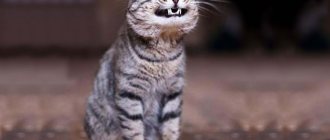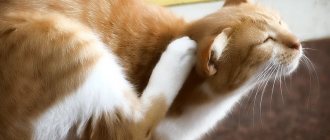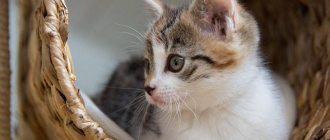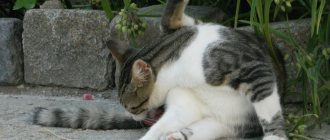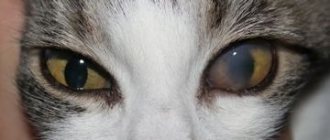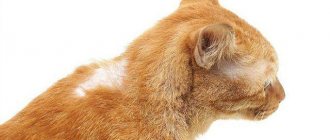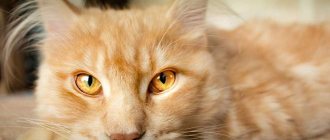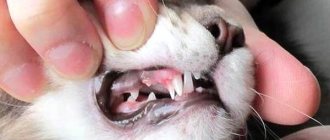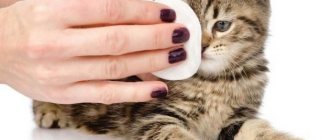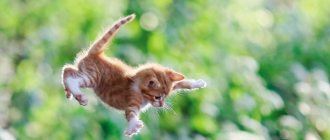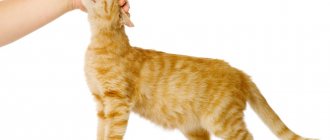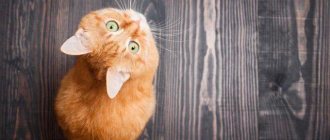The role of vitamins and microelements is very important for the life of any living organism, be it a person or a pet. But in practice, creating a balanced diet for a cat is not so easy. The off-season period is especially difficult for animals: spring and autumn.
Unfortunately, even balanced food that can be purchased in a store does not guarantee the elimination of problems with vitamin deficiency in cats. Various biological substances will help avoid unnecessary illnesses in the pet and worries for the owners.
Lack of vitamins often affects pregnant cats that were bred for breeding as a source of additional income. An additional risk group is purebred cats, which often require special treatment.
The role of vitamins
Vitamins are an important element in a cat's diet. In the wild, predators obtain them mainly from the meat of prey, which they eat along with the skin, bones, feathers, if it is a bird. And a small but important part from plant foods. Partially in the form of the contents of the victim's stomach.
Pets can also get vitamins by eating their food. In expensive industrial mixtures, super premium or holistic, there are usually enough of them, these foods are balanced in composition.
With a natural diet, the cat most often does not have enough vitamins. The food that a person can offer to a pet does not contain all the elements necessary for the predator’s body. Then vitamin deficiency occurs. The animal becomes lethargic, apathetic, loses its external gloss and grooming, begins to limp, and coordination of movements is impaired.
At the same time, the body is susceptible to multiple diseases, quickly depleted, and does not have the necessary protection.
Each group of vitamins has its own functions:
- A - increases the body’s immune defense, stimulates cell renewal and growth, improves vision.
- B - responds to the proper functioning of the gastrointestinal tract, the condition of the coat and skin, and general activity.
- E is an antioxidant. The functioning of the reproductive system and the development of the fetus depend on it. Therefore, this vitamin is necessary primarily for pregnant females.
- D - necessary for the proper formation of the skeleton, joints and muscles.
- C - helps increase the elasticity of the walls of blood vessels, is responsible for the functioning of the heart muscle and joints.
- H - the condition of the cat’s skin and coat depends on it.
- K is necessary primarily to ensure blood clotting.
- Taurine is an essential amino acid that is most responsible for maintaining a cat's immune system and improving vision.
How to understand which vitamin is deficient
If the animal’s behavior has changed, and it is not possible to take the purr to the veterinarian to understand what vitamin is missing, the following information about vitamins will be useful:
- Vitamin A is found in vegetables, egg whites and fish. If there is too much vitamin, liver poisoning occurs. A lack of vitamin A leads to unsightly fur, slows down the growth of the animal, and causes eye diseases. If inflammation touches the cornea of the eye, loss of vision in the dark can be a serious consequence for your pet.
- B vitamins are found in foods of plant and animal origin. If at least one component is missing, the skeletal and muscular systems suffer, the state of the nervous system leaves much to be desired, and almost all organs do not function properly. As soon as a cat's hair begins to fall out, one can safely suspect a deficiency of B vitamins.
- Weakened immunity always begins with a deficiency of vitamin C. Complications of the painful condition can include inflammation of the joints, swelling and hyperemia of the gum space, oral mucosa, and scurvy.
- Thanks to vitamin D, the animal’s bone frame and strong teeth are formed. Vitamin D is produced in the sun; if the purr spends a lot of time in the sun, the optimal content of magnesium, phosphorus, potassium, and calcium is automatically regulated. Deficiency of the component causes a serious disease - rickets.
- Vitamin E plays an important role as an antioxidant. A male will never be able to fertilize a cat if he lacks vitamin E. To support sexual function, mix vegetables and salad into your fluffy's natural food. If you feed your pet artificial food, choose good premium food.
- Vitamin K is initially synthesized in the body, but can also be obtained from food. If you want your pussy to always be healthy, introduce dairy products, fish, vegetables and herbs into its diet. With a sufficient amount of vitamin K, the necessary production of platelets is carried out.
Causes of vitamin deficiency in cats
Not only good nutrition controls the correct ratio of vitamins in the cat’s body. Vitamin deficiency in a pet can develop for the following reasons:
- unhealthy diet with insufficient vitamin content;
- unsuccessful pregnancy, abnormal fetal development;
- difficult childbirth, lack of maternal feeding;
- chronic diseases of the gastrointestinal tract;
- consequences of past viral infections;
- reduced level of immune defense;
- long-term use of antibiotics and sulfonamide drugs;
- infection of a cat with helminths;
- pathologies of the endocrine and nervous system;
- prolonged stressful conditions;
- general low level of pet maintenance, poor quality care.
How does vitamin deficiency manifest itself in cats?
The first sign of the disease is a decrease in general tone. Then the coat begins to lose its shine, becomes greasy in appearance and unkempt, and it may fall out and areas of baldness may appear. The animal strives for solitude, sleeps a lot, and loses its appetite. Sores and sores may appear on the skin, and itching begins. At first, the disease usually proceeds secretly, its clear signs appear in the second stage.
The lack of a particular vitamin is characterized by a certain symptom.
Vitamin A deficiency
The most painful effect of retinol deficiency is on kittens, both newborns and adolescents.
First of all, the mucous membrane of the eyes suffers, conjunctivitis develops, quickly turning into an acute form. The epithelium of the small intestine is damaged, which causes diarrhea.
An adult cat may develop “night blindness”, the effect of poor twilight vision, which is simply a disaster for a predator.
The condition of the skin and coat also deteriorates; they become dry, brittle, dull, and dermatitis appears. Females may develop infertility, stress and nervous disorders.
Lack of B vitamins
Biochemically, this group is responsible for many body functions, but primarily for the functioning of the nervous system.
Thiamine (B1) and riboflavin (B2) are responsible for the conduction of nerve impulses. In addition, with their deficiency, the functioning of the gastrointestinal tract deteriorates and hemoglobin drops. With a large deficiency, seizures, epilepsy and muscle paralysis may occur.
A deficiency of this group of vitamins is unacceptable for a pregnant female; this can lead to complications, difficult childbirth, postpartum hemorrhage and illness.
It is the lack of riboflavin that can cause the formation of sores and ulcers in the animal’s oral cavity.
Pyridoxine (B6) is largely responsible for the functioning of the musculoskeletal system, but not only. With its deficiency, arthritis, urolithiasis, stomatitis, gingivitis, and conjunctivitis develop. Lack of B12 leads to the progression of anemia, decreased blood clotting, decreased heart rate, and constipation.
Vitamin C deficiency
It is one of the main natural antioxidants. With its deficiency, the body's immune defense sharply decreases, which manifests itself in permanent stomatitis, gingivitis, periodontal disease, bleeding from the gums and even the loss of teeth by the cat. The elasticity of blood vessels decreases, joint diseases appear, and coordination of movements is impaired.
Vitamin D deficiency
Kittens primarily suffer from a lack of this vitamin. Due to improper development of bones and the entire skeleton as a whole, rickets progresses. Children also suffer from painful growth of joints, brittleness of bones, fractures and sprains, curvature of the spine, and diseases of the respiratory system.
Vitamin E deficiency
This is dangerous primarily for the intrauterine development of the fetus. Lack of tocopherol can also lead to infertility, difficult pregnancies and childbirths, miscarriages, and the birth of malformed and dead kittens. Vitamin deficiency type E contributes to the development of pancreatitis and disruption of the digestive system.
General signs of pathology may indicate not only vitamin deficiency; they are also characteristic of many other, more serious diseases. Only a thorough examination at a veterinary clinic will help establish an accurate diagnosis.
Symptoms of vitamin deficiency
Of course, there are certain signs that can indicate developing vitamin deficiency in a cat. But without a proper examination, it is very difficult to confirm a particular diagnosis.
ATTENTION! Most of the signs inherent in vitamin deficiency can be attributed to other diseases, sometimes much more dangerous for the animal.
Vitamin deficiency usually develops in several stages. The first phase is the latent course of the disease. The origin of vitamin deficiency. The second phase - general symptoms of vitamin deficiency appear, which can cause other diseases:
- Skin itching. Areas around the ears and around the eyes will help identify incipient vitamin deficiency. In damaged areas, hair falls out and the skin becomes flaky or scratched. There may be skin diseases or parasites (ticks, in particular), so contact your veterinarian immediately for diagnosis.
- Loss of skin elasticity. If, when collecting the skin into a fold, it quickly straightens out, this may be the first signal in the development of the disease. Just like the appearance of scales on the skin.
- Hair loss. The accompanying symptoms will also be loss of shine, the coat rapidly becomes dull.
- Loss of appetite. The cat refuses favorite foods or has uncontrollable appetite. There may be a desire to try inedible things (earth, stones, feces). This happens against the background of a general decrease in immunity and a slowdown in metabolism.
- Nervous disorders. General apathy of the cat, worsening reaction, poor coordination of movements, or, conversely, unusual aggressiveness or nervousness.
- Unfavorable living conditions. The third phase is specific, in which the deficiency of each specific vitamin has its own symptoms.
Mr. Cat recommends: how to solve the problem
There is no systemic treatment for vitamin deficiency. The main thing here is to identify the problem in a timely manner and understand which groups of vitamins the pet lacks.
You should not give your cat vitamin-mineral complexes independently and uncontrollably. Excess vitamins can lead to smaller, and sometimes even bigger, problems.
It is important to properly adjust the animal’s diet. The veterinarian usually prescribes the use of complexes when the cat eats natural food, in which it is difficult to achieve the required content of the necessary elements.
If your pet is on dry formula, then you may need to switch to more expensive but high-quality food. For example, in the holistic class they are all balanced and no additional vitamin intake is required. This is Savarra, Monge, Grandorf.
If the problem has gone far and adjusting the diet does not solve it, then you will have to purchase special vitamin complexes. The table shows some of them.
| Name | Characteristic | Price, rubles |
| Excel Brewer's Yeast 260 tablets | B vitamins. Contains zinc, brewer's yeast, tuna fat. Appetite, coat and skin quality increase, and the functioning of the nervous and immune systems improves. | 455 |
| Beaphar Top 10 Cat 180 pieces | Multivitamin complex with taurine. A broad-spectrum drug that strengthens the immune system. Can be given to kittens. | 623 |
| Anivital Feli Immun 140 tablets | Vitamins C and E, iron, choline, folic acid. Broad-spectrum complex. | 1730 |
| Beaphar Kitty Mix 180 tablets | Vitamin and mineral complex with taurine, phosphorus, sodium, biotin, leucine, calcium. Strengthening the cardiovascular and immune systems. | 1391 |
| Canina Canivita 100 ml | Multivitamin complex (A, B, C, D, E). Reduces cholesterol, improves heart function, improves immunity, improves the quality of coat and skin. | 936 |
| Gimpet Multi-Vitamin Paste Extra 200 g | Multivitamin complex in paste form. | 640 |
| VetAminex 60 pieces | Multivitamins with zinc, calcium, phosphorus, folic acid. | 2000 |
| Radostin 90 pieces | Vitamin and mineral supplement. | 201 |
| Biorhythm for kittens (morning + evening) 24 doses | Vitamin and mineral complex with taurine, calcium, phosphorus, iodine, molybdenum, iron, zinc, selenium, copper. | 235 |
Effective treatment
After the veterinarian confirms hypervitaminosis, you can begin treatment measures. It is strictly contraindicated to treat your pet independently, without medical advice. First of all, you should exclude new intake of a vitamin that was detected in excess. Therefore, you must immediately abandon the previous food, which contains exceeded the limit of nutrients, and be sure to stop taking vitamin preparations. Next, you will need to adjust the vitamin balance by adding other organic compounds and microelements. At the discretion of the veterinarian and depending on the condition of the cat, symptomatic therapy may be prescribed, for example, medications that normalize stool, sedatives, medications aimed at strengthening bone tissue, improving the skin and fur of the cat.
What foods help overcome vitamin deficiency in cats?
Using the table, you can determine which products can replenish the content of a particular vitamin in your pet’s natural diet.
| Name of vitamin | Products |
| A | Egg yolk, beef liver, butter, fish oil; raw meat, fish, cod liver. |
| B | Raw meat, heart, liver, kidneys, eggs, biokefirs and bioyogurts, carrots, zucchini, beets, greens, brewer's yeast, meat and bone meal. |
| C | Carrots, greens, pumpkin, turnips, spinach, pharmaceutical ascorbic acid without sugar. |
| D | Raw meat, eggs, dairy products, brewer's yeast, meat and bone meal. |
| E | Greens, sunflower and olive oils, sprouted grains (oats, wheat), fish oil. |
| H | Raw meat and liver, brewer's yeast. |
Vitamin preparations exist not only in the form of tablets and pastes, but also in injections. But all of them are prescribed strictly under the supervision of a veterinarian.
Many of them do not mix with each other. Vitamins B, C, U are water soluble. They stimulate metabolism and biological synthesis. A, D, E, K - fat-soluble, participate in all physiological processes in the body.
Panthenolic and folic acids, biotin, carotene are provitamins and are responsible for the condition of the skin, wool, bones, muscles and tendons.
With an excess of vitamin A, anaphylactic shock and general intoxication can develop. Hypervitaminosis B - severe allergic reactions to Quincke's edema, C - lead to diabetes.
Therefore, at the first signs of vitamin deficiency, you should immediately consult a veterinarian. Only a detailed blood test will show the true picture of the disease.
All specialist prescriptions must be carried out accurately, without exceeding dosages. During the treatment process, constant monitoring by a veterinarian with regular blood tests is necessary.
How is it diagnosed?
If symptoms and unusual behavior of the animal are detected, you should contact a specialist for examination.
If you observe unusual behavior in a cat and externally manifested symptoms of hypervitaminosis, you need to show your pet to a veterinarian, who, after conducting a diagnostic examination, will confirm the diagnosis and prescribe appropriate treatment. The doctor will need information about the animal’s chronic pathologies, its recent diet, pills taken, and vitamin-containing medications. To make an accurate diagnosis, your veterinarian will need blood and urine results.
